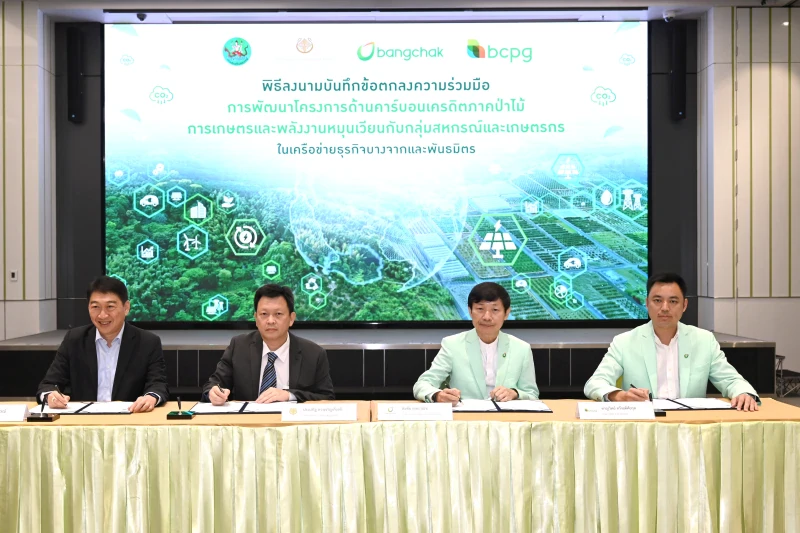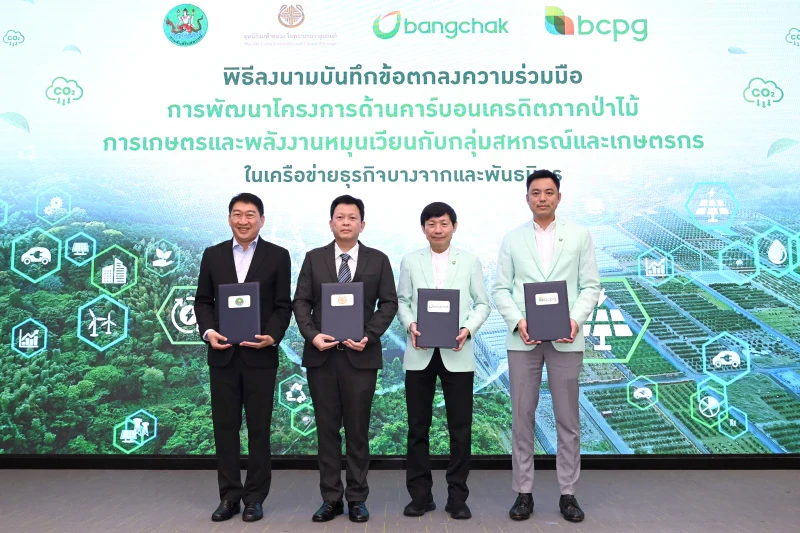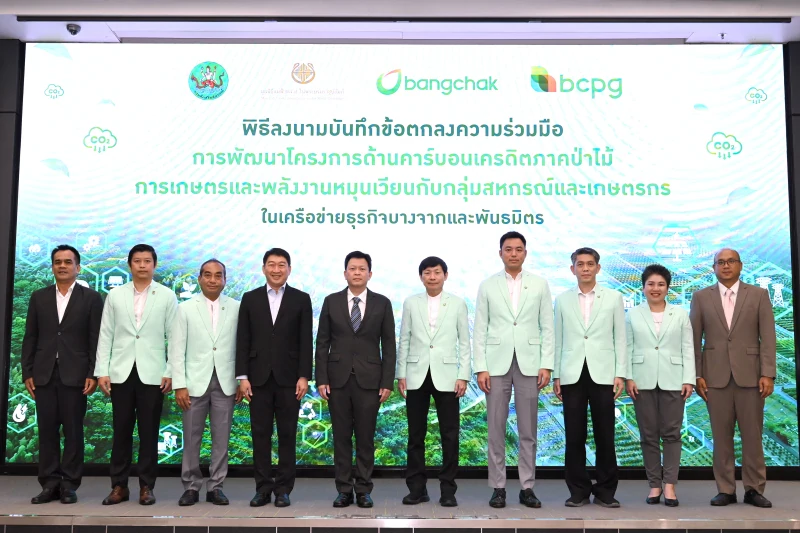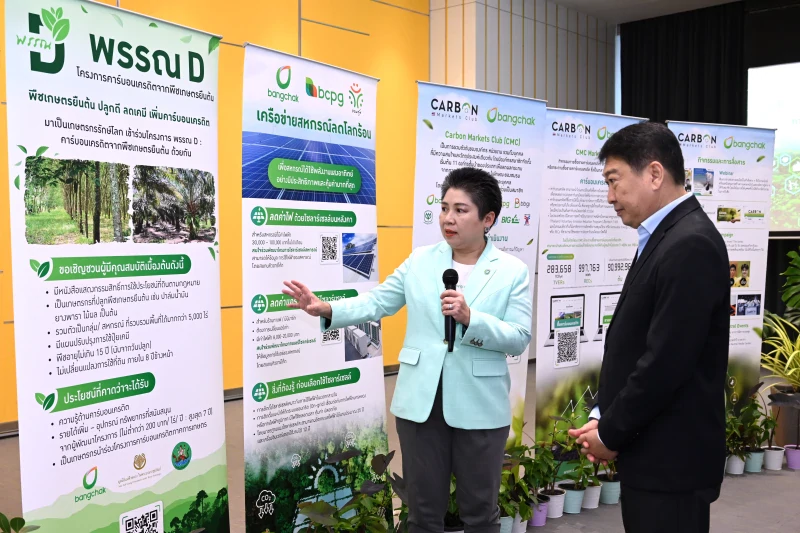23 August 2023
Bangchak and Partners Sign the Memorandum of Understanding on Developing Carbon Credit Projects from Agricultural Sector, and Renewable Energy
Introducing “Plant D” - Carbon Credits from Perennial Agricultural Crops and Solar Energy System with Agricultural Cooperative Network

Somchai Tejavanija, Chief Marketing Officer, Marketing Business Group, Bangchak Corporation Public Company Limited, Wisit Srisuwan, Director-General of the Cooperative Promotion Department, Prasert Trongcharoenkiet, Chief Operating Officer/Social Enterprise, Mae Fah Luang Foundation under Royal Patronage, and Charnvit Trangadisaikul, Senior Executive Vice President of Investment, BCPG Public Company Limited, jointly signed the memorandum of understanding on “the Development of Carbon Credit Projects from the Forestry and Agricultural Sector, and Renewable Energy with Agricultural Cooperatives and Farmers within the Bangchak Business Network and Partners”. This collaboration aims to facilitate mutual communication, promotion, information exchange, knowledge sharing, technology, personnel engagement, and management processes for carbon credit projects from the forestry and agricultural sector, along with renewable energy initiatives involving agricultural cooperatives and farmers within the Bangchak business network and partners. This initiative aligns with the Thailand Voluntary Emissions Reduction (T-VER) program and focuses on utilizing perennial agricultural crops such as para rubber trees, oil palm, and fruit trees, for carbon credit generation, as well as electricity generation from renewable energy for internal consumption. These efforts are geared towards cost reduction in production, fostering the adoption of clean energy, creating added value and benefiting from carbon credit processes.
Somchai Tejavanija, Chief Marketing Officer, Marketing Business Group, Bangchak Corporation, stated “Bangchak Group places great importance on achieving a balance among the three aspects of the energy trilemma: energy security, energy affordability, and environmental sustainability. Today, it is a great opportunity for us to collaborate in support of one of very important stakeholders, the agricultural cooperative network, to have access to clean energy and contribute to the sustainability of resources and the environment
At present, Bangchak manages a network of more than 1,360 service stations nationwide, with over 600 being cooperative service stations or community service stations operated by the network of agricultural cooperatives comprising more than one million households. The network stands as a stakeholder that Bangchak has prioritized and worked closely with for more than 33 years, starting from the establishment of the first cooperative service station in 1990. "It is heartening to learn that agricultural cooperative leaders are inclined towards participating in climate change mitigation efforts. They are interested in utilizing renewable energy and wish to collaborate on carbon credit projects in the agricultural sector. This aligns with the strategic sustainability plans of the Bangchak Group of Companies and is the basis for this collaborative agreement. I would like to express my gratitude to all our partner organizations for their participation in propelling Thailand towards its goals of becoming a low-carbon society.
Gloyta Nathalang, Executive Vice President, Corporate Branding, Communication and Sustainability Activation, Bangchak Corporation Public Company Limited, as the project initiator and executor, provided background on this collaboration. “This partnership has arisen from the shared commitment of all stakeholders to address the pressing global issue of climate change. For Bangchak Group, we have outlined the BCP316NET plan, aimed at achieving carbon neutrality by the year 2030 and net-zero greenhouse gas emissions by 2050. This plan is structured around four key pillars; namely, B = Breakthrough Performance (30%): focusing on highly efficient production processes, process improvements, low-carbon emissions, and environmentally friendly operations. C = Conserving Nature and Society (10%): supporting the creation of an environmentally balanced system and connecting with a low-carbon society through natural carbon sequestration. P = Proactive Business Growth and Transition (60%): transitioning our business towards clean energy through sustainable growth, increasing income from green businesses, and expanding new investments that reduce greenhouse gas emissions from our operations. NET Zero Ecosystem: Building an ecosystem to support the journey towards net-zero emissions."
This collaboration was initiated as part of the concept of carbon credits from the agricultural sector and renewable energy. Agricultural cooperatives that operated Bangchak cooperative service stations also managed successful perennial agriculture businesses, and numerous cooperatives aimed to transition towards electricity production from renewable energy for their own consumption, thereby reducing production costs and promoting clean energy usage. Bangchak recognized the opportunity to support agricultural cooperatives and farmer groups interested in participating in the project by providing knowledge about global warming, operating carbon credit projects from perennial agricultural crops in collaboration with Bangchak or installing solar energy systems. Bangchak will assume the role of project co-developer and main coordinator, by communicating with target groups, raising awareness, and understanding, as well as participating in site surveys and follow-ups alongside working teams from Mae Fah Luang Foundation under Royal Patronage and BCPG Public Company Limited. This effort is supported by the Cooperative Promotion Department. It supports projects through the registration and verification process of the Thailand Greenhouse Gas Management Organization (Public Organization)’s Thailand Voluntary Emissions Reduction Program (T-VER) and encourages all sectors to take part in reducing greenhouse gas emissions.”
Wisit Srisuwan, Director-General of the Cooperative Promotion Department stated that “Currently, numerous countries place high priority on fostering environmental balance. Carbon credits stand as a critical tool in reducing greenhouse gas emissions and addressing global warming issues. Beyond their role in carbon dioxide sequestration, both forests and perennial agricultural crops offer the additional benefit of generating revenue through carbon credits. For Thailand, both the public and private sectors increasingly emphasize carbon credits, aligned with the global trend to reduce greenhouse gases that cause global warming. The Cooperative Promotion Department is delighted to participate in supporting and promoting the project implementation at the local level, including public relations, information dissemination, knowledge sharing, and personnel assistance, etc. Moreover, the department will explore opportunities to expand the project to other cooperatives in the future. This collaboration elevates the standard of low-carbon manufacturing through agricultural carbon credits and aligns with the BCG Economy policy.”
Prasert Trongcharoenkiet, Chief Operating Officer/Social Enterprise, Mae Fah Luang Foundation under Royal Patronage stated that “Mae Fah Luang Foundation has initiated the Carbon Credit from Community Forests for Sustainability project based on its experience and expertise in surveying forest plots to evaluate carbon dioxide sequestration. The Foundation also focuses on disseminating knowledge, fostering skills, transferring work processes, and serving as advisors to communities in need. Through these efforts, communities can develop a systematic database of carbon sequestration, the volume of which can be registered and verified for carbon reductions/sequestration as per the Thailand Voluntary Emissions Reduction program through public agencies. The private sector funds the process, in return, receives carbon credits that can be utilized to reduce their carbon dioxide emissions. The community receives additional income from forest care, contributing to the village fund. This fund can then be employed to improve the quality of life and the preservation of the forests. Bangchak has been a partner of the Carbon Credit from Community Forests for Sustainability project since the system development phase (2020 – 2022) and it continues to support the project’s expansion after 2023. Today, the foundation is delighted to collaborate with Bangchak, taking on an advisory role in the development of carbon credit projects. The foundation actively participates in on-site surveys, project scoping, and project development activities, including progress monitoring to develop the Project Design Document (PDD) for the registration and verification of carbon credits. These efforts drive the successful implementation of projects to register and certify carbon credits from voluntary emission reduction programs.”
Charnvit Trangadisaikul, Senior Executive Vice President of Investment, BCPG Public Company Limited, regarding the role of BCPG in this collaboration, stated “BCPG is among Asia-Pacific’s leading companies in renewable energy. In addition to generating power from clean energy technology, the company places importance on seeking innovative products and services to address consumer energy consumption and reduce environmental impacts for a sustainable future. In today’s collaboration, BCPG will not only participate in managing the installation of solar energy systems for interested agricultural cooperatives but will also support agricultural cooperatives or farmer groups in terms of knowledge about carbon credits, low-carbon practices, crop maintenance, and the implementation of efficient digital data management systems. This will be accomplished through training, knowledge sharing, monitoring, and audits to ensure the development of projects proceeds accordingly.”
As a result of today's partnership agreement, Bangchak Corporation and its partners will introduce the "Plant D” project, which involves carbon credits from perennial crops to enhance the value of agricultural produce. Additionally, solar energy systems will be installed to support business activities through the Oam Suk Social Enterprise. Several agricultural cooperatives have expressed their interest in participating and have already undergone preliminary assessments. These two projects are set to commence in September."





